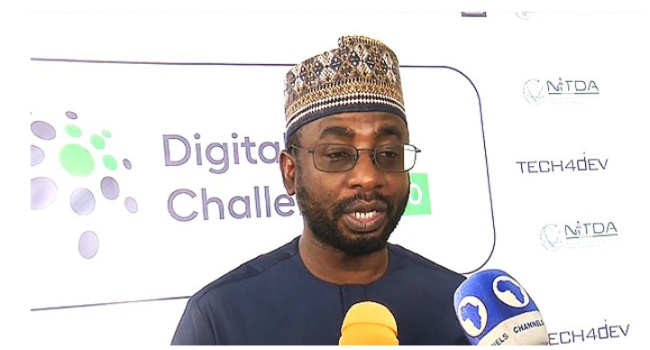The Federal Government has set out plans to achieve 95 per cent digital literacy among Nigerians by 2030, aiming to train and empower at least 30 million citizens by 2027.
The Director-General of the National Information Technology Development Agency (NITDA), Kashifu Abdullahi, represented by the Director of Stakeholder Management, Aristotle Onumo, disclosed this in Abuja at the Grand Finale of the Tech4Dev Digital for All Challenge 2.0.
Abdullahi explained that NITDA is driving the initiative through strategic partnerships, particularly with the National Youth Service Corps (NYSC) and educational institutions nationwide.
He said, “The DFA 2.0 competition aligns with NITDA’s vision. Our goal is to ensure 95 per cent of Nigerians become digitally literate by 2030. By 2027, we want to see 30 million Nigerians trained and empowered. We cannot achieve this alone, which is why we are working with partners.”
Highlighting NYSC’s role, Abdullahi stated that the agency trains corps members as Digital Literacy Champions deployed across the country. “Currently, every local government area has Champions training citizens. Our portal also provides real-time data on the number of Nigerians trained,” he added.
He revealed that NITDA, in collaboration with the Ministry of Education, has integrated digital literacy into the national curriculum at all educational levels. “Digital literacy is now part of the curriculum for primary, secondary and tertiary institutions. For example, Nasarawa State University has embedded it into its General Studies programme. By the end of their first year, students earn Cisco certification, preparing them for the digital economy,” he said.
Abdullahi noted that civil servants are also being targeted. “Digital literacy is now a compulsory requirement in promotion examinations for civil servants. This marks another step towards a digitally literate nation,” he explained.
He commended Tech4Dev for its collaboration, describing the Digital for All Challenge as a “shared vision”. He stressed that digital skills form the foundation for innovation, job creation and sustainable prosperity.
Abdullahi congratulated the winners, urging them to see the challenge as transformative. “The young innovators we celebrate today are embracing digital skills as tools for empowerment and nation-building. The future is not something we wait for; it is something we create,” he said.
Minister of State for Labour and Employment, Nkeiruka Onyejeocha, reaffirmed the government’s commitment to advancing digital literacy for job creation and national development.
UK International Development Digital Access Programme Adviser and Africa Cyber Programme Country Lead, Idongesit Udoh, described the initiative as a landmark project that broadened digital skills nationwide. He noted that it strengthened service delivery, opened digital opportunities for children and youths, and enhanced Nigeria’s global competitiveness.
Tech4Dev Co-founder, Oladiwura Oladepo, emphasised the impact of the challenge, stating that the first edition directly benefited 18,000 young Nigerians. The second edition, she explained, aimed to deepen digital literacy and unlock opportunities across diverse age groups and professions, including learners, youths, and civil servants.
Over one million Nigerians have participated through training, assessments, and awareness campaigns. The competition attracted participants from all six geopolitical zones, with substantial cash prizes awarded: Miracle Michael won ₦15 million; Chinedu Arisa, ₦12.5 million; Ismail Adam, ₦10 million; and Uluchi Chibueze, ₦7.5 million.



